Gaza hostage rescue: Israeli mum begs for release of her children kidnapped by Hamas
As Israeli forces push deeper into Gaza, Hadas Kalderon — whose children have been missing for three weeks, snatched by Hamas militants — is gripped by fear: ‘I want to believe that our army and our government knows what they’re doing.’ She’s not alone.
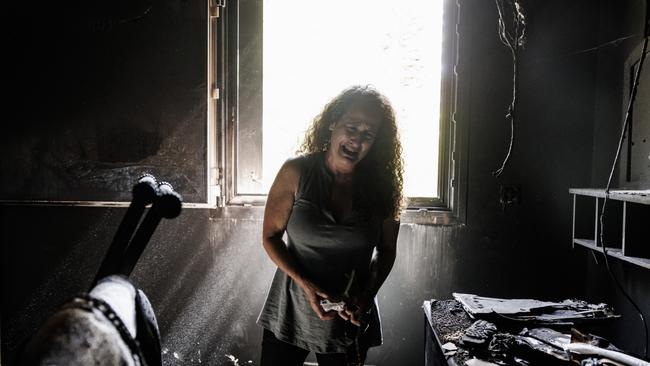
Beside the scorched homes of Nir Oz, near Israel’s border with Gaza, kibbutz residents fear for their loved ones more than three weeks since they were abducted by Hamas militants.
Hadas Kalderon had spent two decades in the small and rural community when it was decimated in an attack by the Hamas gunmen who crossed from Gaza on October 7.
Of about 400 residents, an estimated 100 were killed and 80 taken hostage, according to the Israeli military.
Ms Kalderon said her mother and niece were killed, while her 12-year-old son and 16-year-old daughter were abducted.
“Whatever we do, they’re in huge danger,” said the 56-year-old, walking through the kibbutz where multiple homes have been torched.
“I want to believe that our army and our government knows what they’re doing,” she added.
“I don’t have any control and knowledge about army actions, I just know my children are still there in the middle of a war.”
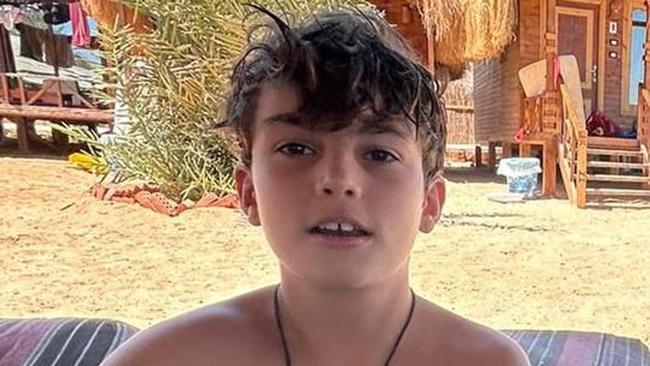
Across dozens of communities and military posts neighbouring Gaza, 1400 people were killed on October 7 according to Israeli officials. Retaliatory strikes on Gaza have killed more than 8300 people there, the health ministry in the Hamas-run territory said.
Fears are growing among the families of more than 230 hostages, particularly since Israel has further intensified its airstrikes and has pushed troops into Gaza.
Ms Kalderon, speaking to journalists on a visit to Nir Oz organised by Israel’s military, said the most important thing was “bring them home safe and healthy”.
“To make an agreement immediately, not to wait,” she said.
Hamas has released four civilians, including an 85-year-old woman from Nir Oz, while the Israeli military said it had freed a soldier in ground operations in the Palestinian territory.
Amid a spiralling humanitarian crisis in Gaza, home to 2.4 million residents, Israel has called for the hostages to be released and has vowed there will be no ceasefire.
The relentless bombardment can be heard 2km from the border in Nir Oz, where soldiers manned newly erected military posts.
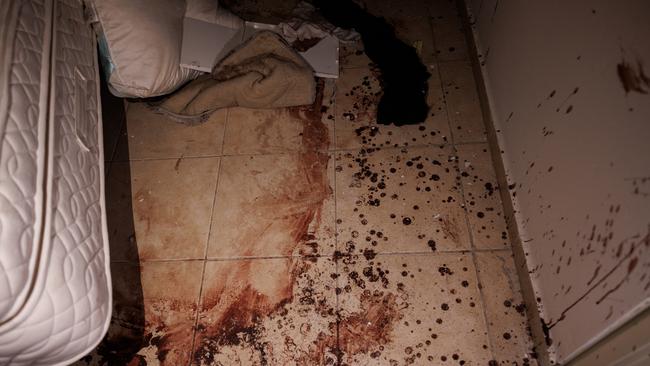
The survivors from the kibbutz have been evacuated, but some have been permitted to return briefly. Ran Pauker, 86, escaped the attack because he was visiting his daughter’s home in the nearby town of Sderot. “I’m very worried because our government forgot us. They didn’t take care of us and I do hope that the killing will stop. I don’t want it,” he said.
Speaking of his “very good friends in Gaza”, who in the past visited his home, he agreed the top priority is to free the hostages.
“And then … we have to solve the problem between the (Israelis and) Palestinians, with our neighbours. Without that, never will there be peace.”
In a coup that unified the nation and renewed hopes among the families of other hostages, Private Ori Megidish was rescued in an operation directed by army and intelligence chiefs watching from a situation room inside Israel. Authorities confirmed that they had become aware of Private Megidish’s location and mounted the operation specifically to save her.
Hamas on Monday released a video of what it said were three women hostages, seated against a tiled wall. One urged Israel to agree to a Hamas-demanded prisoner swap. Prime Minister Benjamin Netanyahu dismissed the clip, the time and place of which could not be verified, as “cruel psychological propaganda”.
Hamas militants hunted
Israeli troops pushed deeper into Gaza Tuesday, driving tanks and armoured bulldozers through the rubble of shattered buildings and hunting for Hamas militants who carried out the worst attack in Israel’s history.
Army footage showed soldiers, who are also seeking to free hostages, advancing through a devastated landscape, with buildings reduced to a mangled mess of stone and twisted metal by weeks of relentless Israeli bombing.
Israel said it had struck 300 targets in the fourth night of land operations in Gaza, coming under Hamas anti-tank and machine-gun fire, as Netanyahu dismissed growing international calls for a ceasefire.
AFPTV footage over Gaza showed a huge plume of smoke billowing up from another Israeli strike. The bombing campaign has killed 8,306 people, according to Gaza’s Hamas-run health ministry, many of them children.
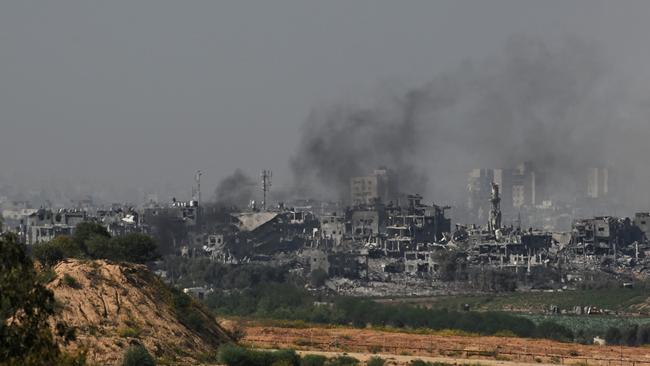
Images taken by AFP reporters in Gaza showed Palestinians combing the rubble in a desperate search for survivors, and praying over the bodies over those killed, wrapped in white shrouds.
Netanyahu said pausing operations now would be a “surrender” to the Palestinian militant group responsible for brutal raids on Israeli homes, farms and villages that killed an estimated 1,400 people and saw at least 240 hostages taken according to the latest count given by Israeli officials.
But the humanitarian toll has sparked a global backlash, with aid groups and the United Nations saying time is running out for many of the territory’s 2.4 million people denied access to food, water, fuel and medicine.
Surgeons are conducting amputations and other operations on hospital floors without anaesthetic, and children are forced to drink salty water, said Jean-Francois Corty, vice-president of Medecins Sans Frontieres, which has 20 staff on the ground.
Rizk Abu Rok, a 24-year-old paramedic with the Palestinian Red Crescent, told AFP he arrived at the scene of a strike at a cafe only to find his father and several other relatives dead.
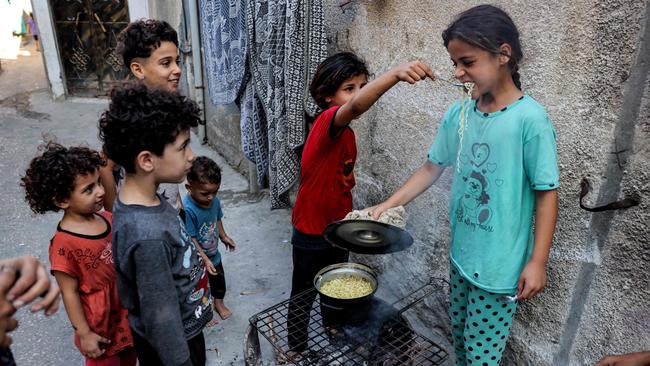
“I rushed to the emergency room and found my father there. He had a head wound. I knew immediately that he was dead,” he said.
“I collapsed and lost my nerve. The nurses brought me outside to calm me down.” Israel has accused Hamas of using hospitals as military headquarters and civilians as “human shields”, charges the militants dismiss as “baseless” propaganda.
Lebanon struggling to avoid joining the conflict
Lebanon’s caretaker prime minister says he is working to ensure his country does not enter the Hamas-Israel war, even as Hezbollah and Israel have exchanging cross-border fire.
Najib Mikati said he feared an escalation, with the border skirmishes stoking concerns that Lebanon’s powerful Iran-backed Hezbollah movement, a Hamas ally, could open a new battlefront with Israel.
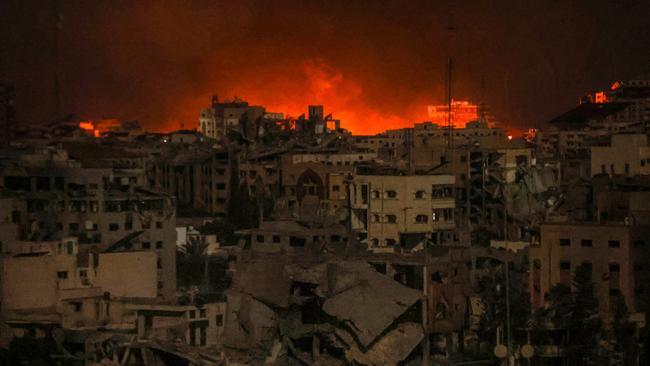
“I am doing my duty to prevent Lebanon from entering the war” raging further south, Mr Mikati said.
Cash-strapped Lebanon is facing the possibility of a war essentially leaderless, as political divisions have left the country without a president for a year, while Mr Mikati has headed a caretaker cabinet for about 18 months.
“Lebanon is in the eye of the storm,” he said.
Mr Mikati, who is on good terms with Hezbollah, said he had no “clear answer” about whether war loomed, adding that “it depends on regional developments”.
Israel and Hezbollah fought a bloody conflict in 2006 that left more than 1200 people dead in Lebanon, mostly civilians, and 160 in Israel, mostly soldiers.
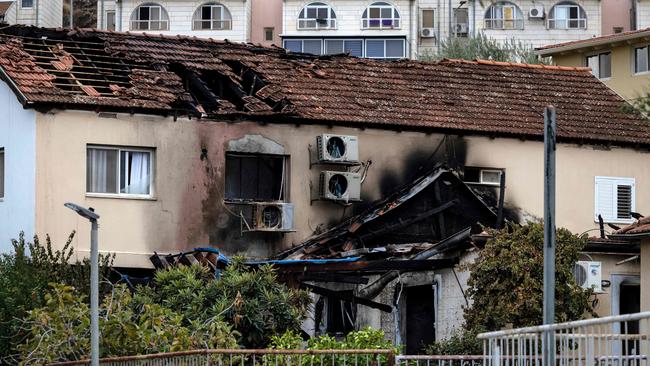
“For now, Hezbollah has managed the situation rationally and wisely, and the rules of the game have remained constrained to certain limits,” Mr Mikati said. “But at the same time I feel like I cannot reassure Lebanese” because the situation is still developing.
Hezbollah, which has a more powerful arsenal than Lebanon’s army, has so far restricted itself to targeting Israel’s northern border region.
The Shi’ite Muslim movement’s leader, Hassan Nasrallah, is set to make a televised speech on Friday, his first such address since Hamas’s October 7 assault on Israel.
Skirmishes on the Lebanon-Israel border have killed at least 62 people in Lebanon, according to an Agence France-Presse tally, mostly Hezbollah combatants but also four civilians. Israeli officials have reported four deaths, including one civilian, and Mr Mikati said any escalation could extend beyond Lebanon.
“I cannot rule out an escalation because there is a race to reach a ceasefire before escalation spreads in the entire region,” he said.
“I fear that … chaos could engulf the entire Middle East.”
Iran-backed or affiliated groups have also launched attacks on Israel from Syria, and targeted US forces stationed in Iraq and Syria.
Lebanese people were weary of conflict, Mr Mikati said, in a country that was battered by a 1975-1990 civil war, 22 years of Israeli occupation and the 2006 war with Israel.
“Lebanese have had enough of wars,” he said.
AFP
